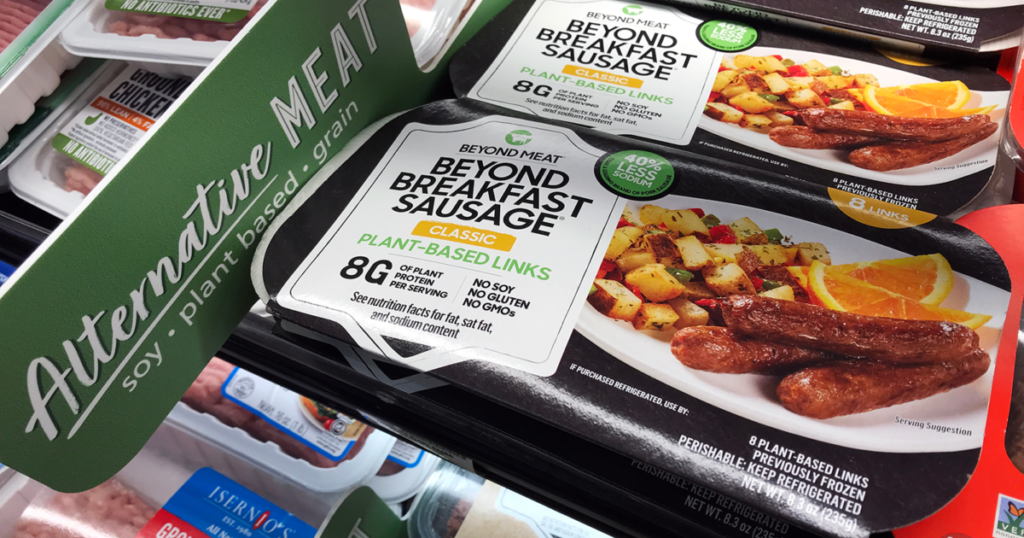Are plant-based meats the future or a fad?
Beyond Meat and the Impossible Foods are only a couple of the best-known names in the meat-alternative sector. When Beyond Meat went public in 2019 it became the most successful major public offering since the 2008 financial crisis, and investors – and competitors – rushed into the scene, pushing its share price up to almost $240. But in the most recent quarter, Beyond Meat showed a $15 million loss with a 23% decline in sales. While many are quick to paint the industry as a ‘fad,’ and that the difficult times are the beginning of the inevitable end of the market, there are actually multiple factors at play.
A victim of its own success
Due to the influx of new products, some clever marketing around lower environmental impacts, plus a growing interest in how a vegan diet can be healthier, many people tried the new meat-alternatives even though they didn’t necessarily identify as vegan or vegetarian. However, research firms like Euromoniter believe that many people tried the lower-quality products, rather than higher-value items like Beyond Meat. This could have led to many people having bad experiences and ditching the meat-alternatives for the real thing.
However there is also the point that the growing market share of meat alternatives led to much closer examinations of what exactly was in the new products. Eventually, enough people had looked at the ingredients list that the question of ‘what is in these’ was being asked frequently. This led to something of a backlash against the fake meats and their health claims, although proponents would argue that Beyond and Impossible never claimed that their products were meant to be healthy alternatives – only meat-free ones.
Trading down rather than returning to meat
The big drop for Beyond Meat came during 2022, as the cost-of-living crisis hit. This was especially felt in the UK, USA, and Europe, where a large market exists for meat-like alternatives. As shoppers began to trade-down – the practice of switching from expensive products and brands to cheaper alternatives in a bid to conserve cash – vegans and vegetarians began swapping expensive imitation food for beans, lentils, and other staples. Beyond Meat CEO and founder Ethan Brown is aware of this, and has said that, “It seems reasonable that consumers may retreat from protein that can be 2x the price of its animal-based equivalent during periods of intense inflation and reduced buying power, and that a reduction in price given this dynamic would spur increased consumption.” It is true that plant meat still costs more than the real thing, and with inflation pushing up prices across the supermarket, many grocery shoppers have been forced to try and conserve cash in any way possible.

But while it might be expected that those who had not committed to a meat-free lifestyle likely turned back to animal meat, this is not supported by data. A September 2022 survey of UK adults by the consultancy Public First found that, actually, 28% were buying less meat in response to the soaring cost of living.
Stability rather than failure
Further evidence that fake meats are not a ‘fad’ is the fact that although Beyond Meat has had a rough time in the stock market recently, other meat-alternative manufacturers have not. Impossible Foods does have plans to lay off roughly 20% of its workforce, per a Bloomberg report, however spokespersons have denied there are any problems with their sales.
In fact, others have noted that the dramatic rise of Beyond Meat’s stock is reflected in its sudden decline. This has led to the opinion that rather than this being evidence of a catastrophic collapse of the market, this is simply the beginning of a more stable trajectory and that fake meats were simply hyped beyond what made business sense at the time.

Louisianna Waring, the senior insight and policy officer for the Vegan Society, has echoed this, saying that, “in the last few years we have seen some vegan product categories in the UK see double, and even triple-digit, growth. This huge boom was always likely to lead to a slight decline in sales where the market stabilizes, innovates, and then increases again.”
The number of people living a vegan or vegetarian lifestyle has increased rapidly in recent years, to the point where plant burgers appear on nearly every restaurant menu. Despite numbers that might worry investors, if Beyond Meat can make it through the current crisis they will be well placed to capture the market again. And if they can’t, another meat-alternative product from another manufacturer almost certainly will.
Photos : futuremarketinsights.com / thebreakthrough.net / joyful.vc
















There are no comments
Add yours